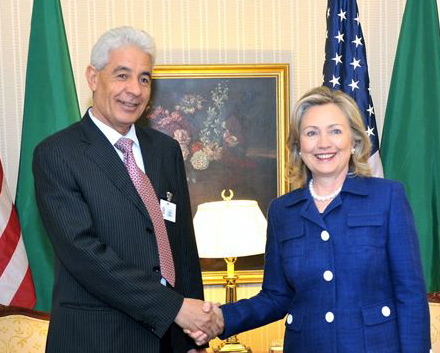The Musa Kusa I Knew
A driver of Libya's turn from terrorism and WMD, the former foreign minister was always more of a diplomat than a thug.
 The defection from the Libyan regime by Musa Kusa, the foreign minister and before that the longtime head of Libya's External Security Organization, is a significant development that raises legitimate hopes that the regime will crumble from within. Such a prominent defection increases the chance that still more of Muammar Qaddafi's subordinates will desert him. Kusa's move is significant for me also because I did business with him in secret meetings twelve years ago. After Libya surrendered for trial the two suspects wanted for the bombing of Pan Am 103—the subject of the international sanctions maintained against Libya for much of the 1990s—Qaddafi's government conveyed through an intermediary its desire to talk with the United States about turning over a new leaf and moving toward normal relations. The resulting U.S.-Libyan talks that began in 1999 led eventually, after fits and starts, to the agreement in 2003 (also involving Britain) which confirmed not only Qaddafi's getting out of international terrorism but also his giving up of unconventional weapons programs. The principal focus of the early rounds of talks was terrorism and counterterrorism. The initial phase of U.S.-Libyan cooperation against Islamist terrorism was conducted by Kusa and myself.
The defection from the Libyan regime by Musa Kusa, the foreign minister and before that the longtime head of Libya's External Security Organization, is a significant development that raises legitimate hopes that the regime will crumble from within. Such a prominent defection increases the chance that still more of Muammar Qaddafi's subordinates will desert him. Kusa's move is significant for me also because I did business with him in secret meetings twelve years ago. After Libya surrendered for trial the two suspects wanted for the bombing of Pan Am 103—the subject of the international sanctions maintained against Libya for much of the 1990s—Qaddafi's government conveyed through an intermediary its desire to talk with the United States about turning over a new leaf and moving toward normal relations. The resulting U.S.-Libyan talks that began in 1999 led eventually, after fits and starts, to the agreement in 2003 (also involving Britain) which confirmed not only Qaddafi's getting out of international terrorism but also his giving up of unconventional weapons programs. The principal focus of the early rounds of talks was terrorism and counterterrorism. The initial phase of U.S.-Libyan cooperation against Islamist terrorism was conducted by Kusa and myself.
One can only imagine what cascade of thoughts must go through the mind of someone contemplating defection. The stakes for Kusa in this instance are at least as high as for other defectors or would-be defectors elsewhere. Anyone as prominently associated with the security apparatus of Qaddafi's regime would face a grim future in a post-Qaddafi Libya. But as long as the Libyan dictator clings to power over even a portion of the country, an exiled Kusa faces the danger of being hunted down by the dictator's agents. Kusa would know this all too well, having probably had a part in the hunting down of earlier exiled dissidents. His defection was in part the placing of a bet against Qaddafi's ability to cling to power indefinitely.
But I think his decision reflects more than just a calculation of odds about the outcome of the current Libyan civil war. Kusa is an urbane, polished man who would not look out of place as a minister or ambassador in the service of a western government. He has a western education, in the form of a bachelor's degree from Michigan State University. He is not the image of a revolutionary or a subversive; he comes across as a polite and pragmatic diplomat. Whatever thuggish history may be in his past, it is hard to picture him as representing the current thuggish elements of the Libyan regime. In this moment of trial, anguish, and uncertainty, probably something inside told him that he belongs in the west.
In those initial talks twelve years ago, part of my job was to take the measure of the Libyans and to determine whether they were serious about getting on the good side of counterterrorism. Given whom I was dealing with, this really meant taking the measure of Kusa. I concluded that he, and the government he was representing, were indeed serious about this. We do not know exactly what role Kusa played in persuading Qaddafi to make his dramatic turnaround in policy, but Kusa was the chief implementer of the new policy and I have every reason to think that he fully believed in it and was fully committed to it.
Kusa probably hoped Libya's new direction would enable him to become more of a diplomat and less of a thug, while sufficiently staying in the good graces of the regime he served to stay alive. The new direction promised a new world in which he could more comfortably live with himself as well as living with the regime. Now that world has crashed around him, and he has to rely on the leverage that comes from his valuable knowledge of Libyan matters to receive the mercies of the British.
